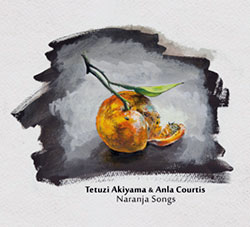
"I am more interested in the sound and resonance inside the instrument itself. Also, I am not afraid to make some melodic phrases even in the free-form session", says guitarist Tetuzi Akiyama. His Argentinian counterpart on this album, guitarist and noisemaker Anla — sometimes Alan — Courtis once expressed, "The main problem is to believe there is only one valid criteria to say what is music and what (is) not, and even more problematic is to decide who is in fact allowed to make that decision for the rest of the planet." Can you anticipate the potential here?
On Naranja Songs, Akiyama and Courtis (both acoustic here) at once both eschew and embrace the idiosyncrasies of their instruments, form and other elements of sound. There is perhaps less of a pursuit of "music" and more of mood, as each of the four works demonstrates a relatively distinct approach. In an offbeat way, you could label Naranja Songs a folk record, but without stylistic or geographical borders. The warts-and-all performances provide a deeply intimate and honest experience reminiscent of, say, Joni Mitchell's "River", or an African vocalist and mbira player pouring out their souls at a funeral.
With "Mind Mochileros" the duo entwines and releases, flexes and relaxes in a serpentine dance of sorrow nudged along in a progression rooted more in rhythmic animation than harmonic materials; Akiyama and Courtis are melodically locked at all times, but that tonal center darts around like a sonuvabitch with twanging escape tones and open strings dancing around the fold. "Springs and Strings" is an exercise in sustain with one man on rapid mute arpeggios and the other churning out a warbling string grind up and down the neck. "The Citrico Vibe" demonstrates a devotion to Blues while taking the genre on a different trail. Akiyama and Courtis work in a loose ostinato that rises and ducks in a flowing swirl. The permasmile sweetness and running-through-a-field freedom of the first half turns to claustrophobia once the duo slinks into a steady march of dissonance.
The finale, "Los Frets Nomades", begins with a brief rolling lament; the piece turns icy when cross-faded with bow on strings and a percussive repeating staccato tri-tone. The bowing continues with much patience for five minutes, and a host of harmonics, buzzing and scratching sound combinations spill out as a trance-inducing gesture — further enhanced by whoever is moving the faders and panning ever so slightly. That last part stands out as kind of odd for such an organic record (it happens a handful of times throughout), but who's making the rules here? Exactly.
Comments and Feedback:
|



